Written by Jenna Dreisenstock
Artwork Credit: Joel Mayorga
The diversity of the music world runs as the vivid neon roots of all that we know and experience in our lifestyle of pop-culture, media and each individual auditory traverse. Each genre of music is interconnected by their very foundations as without one genre another would never have arose; without the experimentation of timbres, tones and forms from various styles of music, the genres we know and love today may have never graced our lives at all. The cultivation of this world has relied on the relaying, converting, understanding and evolution of cultural and societal norms since very early years in human history; in which humankind made their first trip across the oceans and explored new territories – with this came new understanding of life, humanity and the world of which we live in. The influences and artifacts picked up and around the world brought new light to many peoples, weaving worldly traditions in to create entirely individualised ones, or grow ideas and communities; for example, the influence of religious symbolism, lore and history within the different religions throughout history. Not only did cultural beliefs and ways of living carry over and begin integrating into different parts of the world, but so did early forms of music creation and expression.
The influence and integration of many cultures and traditions regarding musical history has led to beautiful creations and lore throughout the ages; and the intersectionality of these traditions have found themselves in many ways interwoven with modern pop-culture. A quick, more obvious example we could speak of is the birth of rock and roll through jazz and rhythm & blues, and how each genre stems from many other sources. However, in this regard one must question where the line between learning, taking influence from and collaborating turns into straight up appropriation; many people credit an icon such as Elvis Presley with the birth of a genre such as rock and roll, yet without the African-American led rhythm & blues and jazz movements the genre never would have been born; and the issue being Elvis’s name forever remembered in history, while the African-American pioneers of the earlier genres overlooked. What then is the difference between sharing cultural influences to create something new and different in diversity and understanding, or cultures being stolen as novelties to push a profitable image?
For many something like ‘festival fashion culture’ may come to mind; white girls wearing religious native american headdresses as they party on the shoulders of their friends at Coachella, bindis sitting on the white foreheads as a fashion statement while those whose culture it sits integral to are brought down with racist remarks – but the appropriation runs further. The differentiating factor between appreciating and appropriating a culture is in the literal definitions of the words: appreciating the diversity of the world by engaging with others of different cultures, sharing learning from one another – and appropriating, which essentially alienates all those who are actually part of said culture, with white people using their symbolisms, religions, cultural garbs, traditional practices and so on as the newest and latest ‘exotic’ trend.

This ranges from fashion to the very roots of music itself. The weaving of older, traditional music into modern pop-culture (could, and does) create a loving diversity and experimentation open and safe for all types of people ready to connect and engage; however when the beautiful, often religious sounds of other people’s journeys become a trivialised ‘exotic’ novelty, many have passed the point of embracing diversity and have instead turned to aa place of privilege by stealing from, bastardising and exploiting marginalized cultures in which they have no place. I have barely began to scrape the surface regarding the problematic and racist behaviour within the music scene, however it’s important we all keep on our guards and call out racist behaviour wherever we see it. The music scene should be a safe space for all.




